沪教版牛津英语六年级上册知识要点总结
沪教牛津版六年级英语上册Module 4 The natural world 知识点清单
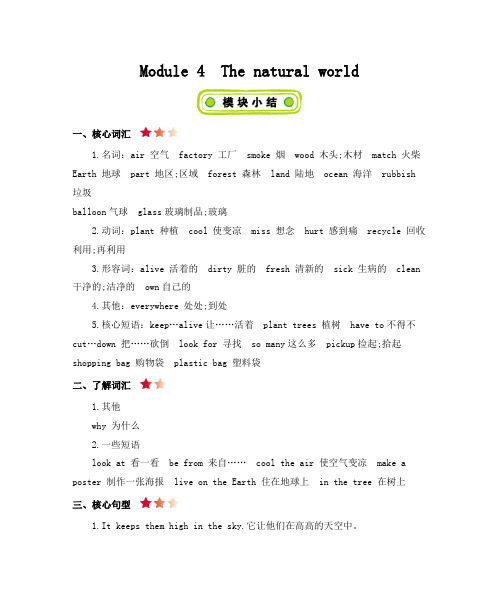
Module 4 The natural world一、核心词汇1.名词:air 空气factory 工厂smoke 烟wood 木头;木材match 火柴Earth 地球part 地区;区域forest 森林land 陆地ocean 海洋rubbish 垃圾balloon气球glass玻璃制品;玻璃2.动词:plant 种植cool 使变凉miss 想念hurt 感到痛recycle 回收利用;再利用3.形容词:alive 活着的dirty 脏的fresh 清新的sick 生病的clean 干净的;洁净的own自己的4.其他:everywhere 处处;到处5.核心短语:keep…alive让……活着plant trees 植树have to不得不cut…down 把……砍倒look for 寻找so many这么多pickup捡起;拾起shopping bag 购物袋plastic bag 塑料袋二、了解词汇1.其他why 为什么2.一些短语look at 看一看be from 来自……cool the air 使空气变凉make a poster 制作一张海报live on the Earth 住在地球上in the tree 在树上三、核心句型1.It keeps them high in the sky.它让他们在高高的天空中。
解读:此句型是表达使某人/某物保持一种状态的句型,这个句型是一个一般现在时的陈述句,主语是第三人称单数it, 所以谓语动词keep 要用其第三人称单数形式keeps。
keep是“维持,保持”的意思,后面接人称代词时要用其宾格形式。
举一反三: He would keep in touch with us wherever he was.他无论在什么地方,他总是与我们保持联系。
Will you keep us the seats?你给我们保留些座位,好吗?It keeps me sticking into my heart. 它使我的心不能忘却!2.We get wood from trees. 我们从树上获得木头。
沪教版牛津英语六年级上册知识要点总结
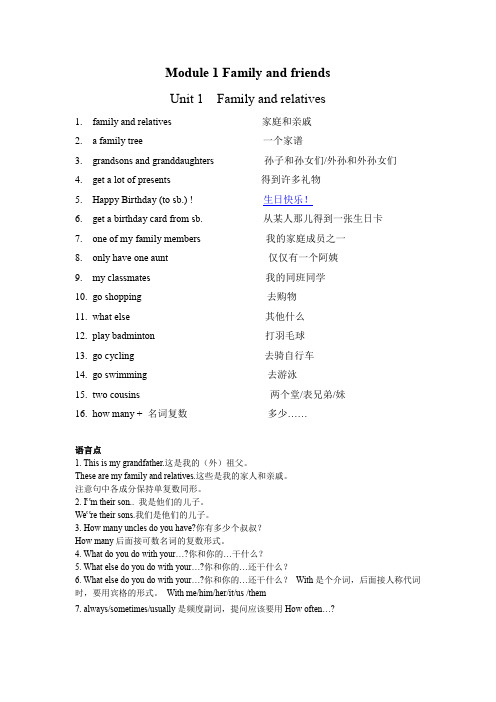
Module 1 Family and friendsUnit 1 Family and relatives1.family and relatives 家庭和亲戚2. a family tree 一个家谱3.grandsons and granddaughters 孙子和孙女们/外孙和外孙女们4.get a lot of presents 得到许多礼物5.Happy Birthday (to sb.) ! 生日快乐!6.get a birthday card from sb. 从某人那儿得到一张生日卡7.one of my family members 我的家庭成员之一8.only have one aunt 仅仅有一个阿姨9.my classmates 我的同班同学10.go shopping 去购物11.what else 其他什么12.play badminton 打羽毛球13.go cycling 去骑自行车14.go swimming 去游泳15.two cousins 两个堂/表兄弟/妹16.how many + 名词复数多少……语言点1. This is my grandfather.这是我的(外)祖父。
These are my family and relatives.这些是我的家人和亲戚。
注意句中各成分保持单复数同形。
2. I‟m their son.. 我是他们的儿子。
We‟re their sons.我们是他们的儿子。
3. How many uncles do you have?你有多少个叔叔?How many后面接可数名词的复数形式。
4. What do you do with your…?你和你的…干什么?5. What else do you do with your…?你和你的…还干什么?6. What else do you do with your…?你和你的…还干什么?With是个介词,后面接人称代词时,要用宾格的形式。
(完整word)牛津沪教版英语六年级上重点知识复习及练习

1.In the writer’s opinion, the most effective way in learning English is ____.A.to practise speaking, writing and feeling itB.to forget your own native languageC.to translate everything into his own languageD.to memorize the English words and grammatical rules2. “Instead of helping you, your own language gets in your way.”This sentence means that memorizing your own language can ________.A.help you to study English wellB.stop you mastering EnglishC.make English easy to learnD.help you notice mistakes3.Eq ually important is to feel the language. “to feel the language” here means________.A.to get a knowledge of English by touchingB.to be able to read and write EnglishC.to translate English into your own by imaginingD.to be able to experience the rich sensation of the languageBWhen we can see well, we do not think about our eyes often. It is only when we can not see perfectly that we come to see how important our eyes are.People who are nearsighted can only see things that are very close to their eyes. Many people who do a lot of close work, such as writing and reading, become nearsighted. Then they have to wear glasses in order to see distant things clearly. People who are farsighted face just the opposite problem. They can see things that are far away, but they have difficulty reading a book unless they hold it at arm’s length. If they want to do much reading, they must get glasses too.Other people do not see clearly because their eyes are not exactly the right shape. This, too, can be corrected by glasses. Some people’s eyes become cloudy because of cataracts. Long ago these people often became blind. Now, however, it is possible to operate on the cataracts and remove them.When night falls, colors become fainter to the eyes and finally disappear. After your eyes have grown used to the dark, you can see better if you use the side of your eyes rather than the centers. Sometimes, after dark, you see a small thing to one side of you, which seems to disappear if you turn your head in its direction. This is because when you turn your head, you are looking at the thing too directly. Men on guard duty sometimes think they see something moving to one side of them. When they turn to look straight at it, they can not see it any more, and they believe they were mistaken. However, this mistake happens because the center of the eye, which is very sensitive in daylight, is not as sensitive as the sides of the eye after dark.4.We don’t know that our eyes are of great importance until ________.A. we think about our eyesB. we cannot see clearlyC. we wear glassesD. we have to do much reading5.According to the passage, a ________ is more likely to be nearsighted.6.People who are farsighted ________ .A.cannot do a lot of close work without glassesB.can only see things that are very close to their eyesC.have difficulty reading a book if they hold it at arm’s lengthD.have the same problem as the nearsighted people7.To see a small thing at night, it is better to look ________ .A.with wide open eyesB.with half shut or narrowed eyesC.straight at itD.in a slightly different directionC Read and answer the questions.It's Sunday today. It's five o'clock in the afternoon. Dick is going to the supermarket with his parents. His father is now cleaning the car. He is going to drive his family to the supermarket. It is far away from their home. His mother is going to buy a lot of food: bread, milk, fruit and drinks. She also wants to buy many other things for the next week. Dick wants to buy a video game machine. His father says to him, 'OK, but you mustn't play video games all the time. After class you must go over your lessons and do your homework first.'They are going to have dinner there and come back at nine o'clock in the evening.They will enjoy themselves very much.( ) 1 Dick and his parents are going to do some shopping today.( ) 2 They are going to the supermarket by bus.( ) 3 The supermarket is not far away from their home.( ) 4 Dick's mother is going to buy a lot of food for the next week.( ) 5 Dick is going to buy a video game machine but he can't play it all the time.( ) 6 They are going to stay in the supermarket for 5 hours.Ⅴ.Choose the right answer.It's Sunday. Mother, father and the children are going to the beach.Alice: Where are we going, Dad?Father. Let's look at the map. Let me see. We will go to the East Point Beach.Mother: We'll swim in the sea.David: Are we going to have a picnic?Alice: Yes, of course.David: That's nice.Father: Come on! Let's all get in the car!Alice: What's wrong (怎么了), Dad?Father: The car can't start (发动)!Mother: So we will all stay at home.Alice: Let's have a picnic in the garden!David: Great!( )1 The family is going to ____________ .A. swim in the seaB. have a picnicC. swim and have a picnic( )2 They are going there ____________ .A. by busB. by carC. by underground( )3 They won't go to the beach ______________ .A. because it is rainyB. because Father is not fineC. because the car doesn't start( ) 4 They will have the picnic ____________ in the end.A. on the beach。
沪教牛津版六年上册单元知识点一览表
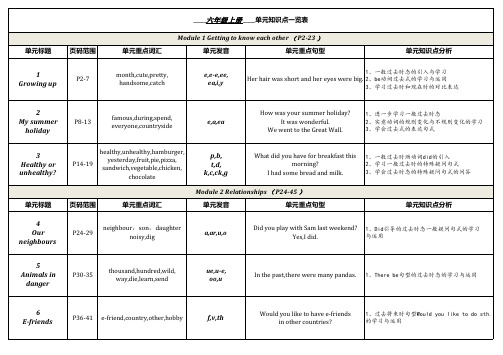
ue,u-e, oo,u
In the past,there were many pandas. 1、There be句型的过去时态的学习与运用
6 E-friends
P36-41 e-friend,country,other,hobby
f,v,th
Would you like to have e-friends in other countries?
P14-19
healthy,unhealthy,hamburger, yesterday,fruit,pie,pizza,
sandwich,vegetable,chicken, chocolate
页码范围
单元重点词汇
p,b, t,d, k,c,ck,g
What did you have for breakfast this morning?
or,al,au, oor,o,a
What did you see at the museum? I saw a lot of interesting cars.
1、一般过去时态的特殊疑问句式的进一步学习
9 Great cities of
the world
P58-63
capital,north,east,west, south,tourist,building
I had some bread and milk.
1、一般过去时助动词did的引入 2、学习一般过去时的特殊疑问句式 3、学会过去时态的特殊疑问句式的问答
Module 2 Relationships ( P24-45 )
单元发音
单元重点句型
单元知识点分析
4 Our neighbours
P24-29
沪教牛津版六年级上册英语全册教案(含单元知识点总结)
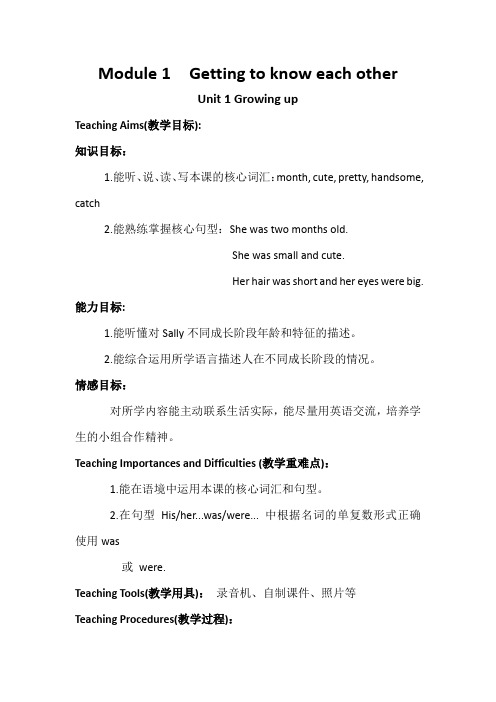
Module 1 Getting to know each otherUnit 1 Growing upTeaching Aims(教学目标):知识目标:1.能听、说、读、写本课的核心词汇:month, cute, pretty, handsome, catch2.能熟练掌握核心句型:She was two months old.She was small and cute.Her hair was short and her eyes were big.能力目标:1.能听懂对Sally不同成长阶段年龄和特征的描述。
2.能综合运用所学语言描述人在不同成长阶段的情况。
情感目标:对所学内容能主动联系生活实际,能尽量用英语交流,培养学生的小组合作精神。
Teaching Importances and Difficulties (教学重难点):1.能在语境中运用本课的核心词汇和句型。
2.在句型His/her...was/were... 中根据名词的单复数形式正确使用was或were.Teaching Tools(教学用具):录音机、自制课件、照片等Teaching Procedures(教学过程):StepⅠ.Warm up and revision(热身与复习)1. Greetings.2. Do some warming-up exercises.3. Review the numbers.Step Ⅱ.Presentation and practice(呈现新语言知识和练习)1. Lead in.T: How old are you?S1: I’m eleven years oldT: You’ll be twelve years old next year. You’re growing up.2. Show some photos and introduce the new words.3. Learn to say and use the words.4. Talk about the photos of Sally.5. Watch the screen and learn to say the sentences.6. Ask pupils to practise in groups.Sept Ⅲ. Learn the story (学习课文)1. Read the story and learn to say the useful sentences.2. Watch the cartoon.Module 1 Getting to know each otherUnit 2 My summer holidayTeaching Aims(教学目标):1.能听、说、读、写本课的核心词汇:famous, during, spend, everyone,countryside2.能熟练掌握核心句型:How was your summer holiday?It was wonderful. We went to the Great Wall.Everyone had a good time.3.读懂有关暑假生活的对话,学会询问别人和介绍自己的暑假生活。
沪教版牛津英语六(上)语法点
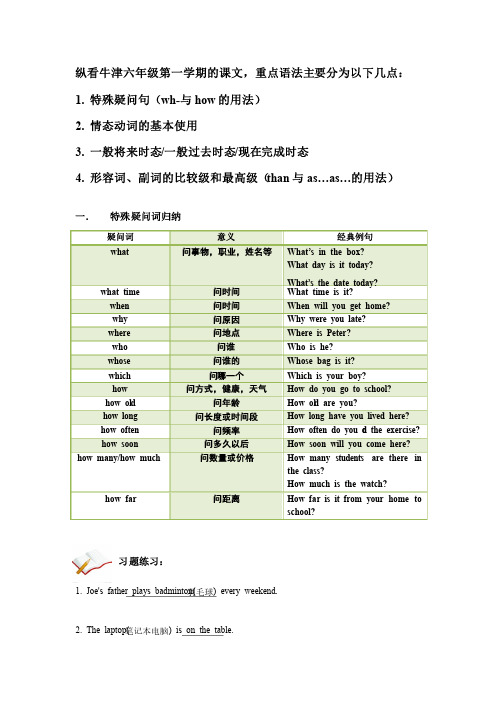
纵看牛津六年级第一学期的课文,重点语法主要分为以下几点: 1. 特殊疑问句(wh-与how 的用法) 2. 情态动词的基本使用3. 一般将来时态/一般过去时态/现在完成时态4. 形容词、副词的比较级和最高级(than 与as as……as as……的用法)一. 特殊疑问词归纳疑问词 意义经典例句what 问事物,职业,姓名等What’s in the box?What day is it today? What’s the date today? what time 问时间 What time is it? when 问时间 When will you get home? why 问原因 Why were you late? where 问地点 Where is Peter? who 问谁 Who is he? whose 问谁的Whose bag is it? which 问哪一个Which is your boy? how 问方式,健康,天气How do you go to school? how ol how old d 问年龄 How ol d are you? d are you? how long 问长度或时间段How long have you lived here? how often 问频率 How often do you d o the exercise? o the exercise? how soon 问多久以后 How soon will you come here? how many/how much 问数量或价格How How many many students are are there there in the class? How much is the watch? how far 问距离How How far far far is is is it it it from from from your your your home home to school? 习题练习:1. Joe's father plays badminton(羽毛球) every weekend.2. The laptop(笔记本电脑) is on the table. 3. My mother is a nurse in the hospital. 4. He gets up at 6:30 in the morning. 5. Li Lei goes to work on foot. 6. It is about 20 kilometers from my home to the town. 7. I have lived in Hang Zhou for 20 years. 8. I’m looking for my watch. 9. The train will start in three minutes. 10. Alice has the violin lesson twice a week. 11. The building with green wall is the post office. 12. He didn’t come because he was ill. 注意事项:由于特殊疑问词孩子们从小学就已经开始接触,对于最基本的what/how/where 等并不感到陌生,出题的难度一般也不会很大。
六年级上册英语沪教牛津版知识要点

Module1Getting to know each other一、核心词汇1.表示时间名词:month一个月的时间;月份yesterday昨天2.形容词:cute可爱的pretty漂亮的handsome英俊的;帅气的famous著名的;出名的healthy健康的;有益于健康的unhealthy不健康的;损害健康的3.动词:catch逮住;捕捉spend度过pick采摘4.食物名词:hamburger汉堡包fruit水果pie馅饼pizza比萨饼cola可乐sandwich三明治vegetable蔬菜chicken鸡肉chocolate巧克力5.表示动物名词:turtle乌龟fly苍蝇6.其他:during在……期间everyone每个人;所有人countryside乡村;农村7.核心词组:grow up长大;成长junior high school初级中学(be)born出生summer holiday暑假the Great Wall长城the Palace Museum故宫博物院Tian’an men Square天安门广场go swimming去游泳go to the museum去博物馆go to the cinema去电影院junior high school初级中学do my homework做我的家庭作业watch TV看电视visit my friends拜访我的朋友a little少量的fish and chips炸鱼薯条二、了解词汇1.一些动词及过去式:go(去)—went do(做)—didhave/has(有)—had watch(观看)—watchedvisit(访问;探望)—visited am/is(是)—was are(是)—were2.一些食物名词:egg鸡蛋bread面包noodles面条dumplings饺子3.其他:menu菜单三、核心句型1.Her hair was short and her eyes were big.她那时头发很短而且眼睛很大。
沪教牛津版六年级知识点归纳

六上Module 1-Getting to know each other教学目的:1.学会在详细语境中运用新单词。
2驾驭某些动词过去式的用法。
3.学会用过去时态表述状态。
4.学会用过去时态表述做的事。
5.驾驭写信的格式。
6.稳固情态动词 can、should用法。
重点词汇: ① mouth cute pretty handsome catch② famous during spend everyone countryside③ healthy unhealthy Hamburgyesterday sandwich vegetablechicken chocolate重点句型:1. I/He/She was...You/We/ They were...2.-How was your summer holiday?-It was/was not ...3.- What did you have for breakfast/ lunch/ dinneryesterday?- I had some...语音发音:e e-e ee ea i y e a eaP b t d k c ck gModule 2-Relationship教学目的:1.学会在详细语境中运用新单词。
2驾驭某些动词过去式的用法。
3.学会用一般过去时的疑问句。
4.稳固wh - questions 在过去语态中的用法。
5.驾驭数词 hundred,thousand的用法。
6.稳固 Would like to...句型和 There be ...句型。
重点词汇: ① neighbour son daughter noisy dig② thousand hundred wild way die learn send③ e-friend country other hobby重点句型:1. - Did you +动词原形+过去时间?- Yes,I did./ No,I didn’t.2.There was a...in the past.There were many...in the past.3.-Would you like to ...-Yes,I’d like to./No, I wouldn’t.语音发音 a ar u o ue u-e oo uf v thModule 3-Out and about教学目的:1.学会在详细语境中运用新单词。
沪教牛津版英语六年级英语上册Module 4 The natural world 知识清单

Module 4The natural world一、核心词汇1.名词:air 空气factory 工厂smoke 烟wood 木头;木材match 火柴Earth 地球part 地区;区域forest 森林land 陆地ocean 海洋rubbish 垃圾balloon气球glass玻璃制品;玻璃2.动词:plant 种植cool 使变凉miss 想念hurt 感到痛recycle 回收利用;再利用3.形容词:alive 活着的dirty 脏的fresh 清新的sick 生病的clean 干净的;洁净的own自己的4.其他:everywhere 处处;到处5.核心短语:keep…alive让……活着plant trees 植树have to不得不cut…down 把……砍倒look for 寻找so many这么多pickup捡起;拾起shopping bag 购物袋plastic bag 塑料袋二、了解词汇1.其他why 为什么2.一些短语look at 看一看be from 来自……cool the air 使空气变凉make a poster 制作一张海报live on the Earth 住在地球上in the tree 在树上三、核心句型1.It keeps them high in the sky.它让他们在高高的天空中.解读:此句型是表达使某人/某物保持一种状态的句型,这个句型是一个一般现在时的陈述句,主语是第三人称单数it, 所以谓语动词keep 要用其第三人称单数形式keeps.keep是“维持,保持”的意思,后面接人称代词时要用其宾格形式.举一反三: He would keep in touch with us wherever he was.他无论在什么地方,他总是与我们保持联系.Will you keep us the seats?你给我们保留些座位,好吗?It keeps me sticking into my heart. 它使我的心不能忘却!2.We get wood from trees. 我们从树上获得木头.解读:这个句子表达某人从某物/某处获得某物句型.get是动词,意为“得到;获得”;from 是介词,意为“从……”;get…from…意为“从……获得……”.举一反三: We got a story book from the teacher. 我们从老师那里获得了一本故事书.I get a toy car from my father.我从我爸爸那里获得了一个玩具小汽车.We get fruit from trees. 我们从树上获得果实.3.We use wood to make pencils. 我们用木头制作铅笔.解读:这个句子是描写某人使用某物制作某物的句型.use在这里作动词,意为“用;使用”,make 也作动词,意为“制作;做”.use…to make…意为“用……制作……”,use 和make后接名词.举一反三: We use paper to make toys. 我们用纸制作玩具.We use the cloth to make clothes. 我们使用布制作衣服.May I use your knife for a while?我用一下你的小刀行吗?4.We should stop cutting down so many trees.我们应该停止砍伐那么多的树木.解读:这个句子是表达我们应该停止做某事的句型.should是情态动词,意为“应该”,后接动词原形.stop意为“停止;禁止”,后接动词-ing形式,表示停止正在做的事情.举一反三: You should stop at a yellow light. 遇到黄灯时你应该停下来.You should stop worrying about it. 你不应该再担心那件事了.We should stop talking in class. 我们应该禁止在课堂上讲话.四、了解句型1.What makes the air dirty?什么使空气变脏?解读:这是一个询问某物使某物变得怎么样的句型.2.It is important to all people.它对所有人来说都很重要.解读:这是一个描写某物/某人对什么很重要的句型.3.That’s wonderful!太好了!解读:这是一个赞美某物的句型.4.The Earth was very clean and beautiful in the past. 在过去,地球是非常干净和美丽的.解读:这是一个描写在过去某地的状态的句型.5.We live on the Earth. 我们生活在地球上.解读:这是一个描写某人住到某地的句型.。
上海牛津6年级第一学期知识点总结梳理
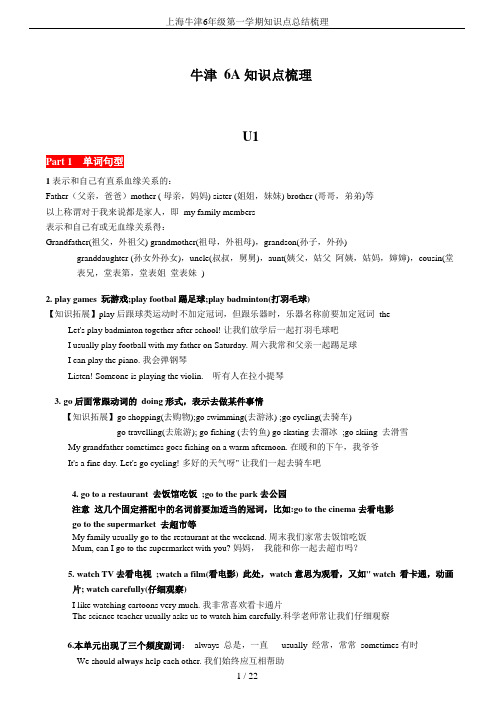
上海牛津6年级第一学期知识点总结梳理牛津6A 知识点梳理U11 表示和自己有直系血缘关系的:Father(父亲,爸爸)mother ( 母亲,妈妈) sister (姐姐,妹妹) brother (哥哥,弟弟)等以上称谓对于我来说都是家人,即my family members表示和自己有或无血缘关系得:Grandfather(祖父,外祖父) grandmother(祖母,外祖母),grandson(孙子,外孙)granddaughter (孙女外孙女),uncle(叔叔,舅舅),aunt(姨父,姑父阿姨,姑妈,婶婶),cousin(堂表兄,堂表第,堂表姐堂表妹)2.play games 玩游戏;play footbal 踢足球;play badminton(打羽毛球)【知识拓展】play 后跟球类运动时不加定冠词,但跟乐器时,乐器名称前要加定冠词the Let's play badminton together after school! 让我们放学后一起打羽毛球吧I usually play football with my father on Saturday. 周六我常和父亲一起踢足球I can play the piano. 我会弹钢琴Listen! Someone is playing the violin. 听有人在拉小提琴3.go 后面常跟动词的doing 形式,表示去做某件事情【知识拓展】go shopping(去购物);go swimming(去游泳) ;go cycling(去骑车)go travelling(去旅游); go fishing (去钓鱼) go skating 去溜冰;go skiing 去滑雪My grandfather sometimes goes fishing on a warm afternoon. 在暖和的下午,我爷爷It's a fine day. Let's go cycling! 多好的天气呀" 让我们一起去骑车吧4.go to a restaurant 去饭馆吃饭;go to the park 去公园注意这几个固定搭配中的名词前要加适当的冠词,比如:go to the cinema 去看电影go to the supermarket 去超市等My family usually go to the restaurant at the weekend. 周末我们家常去饭馆吃饭Mum, can I go to the supermarket with you? 妈妈,我能和你一起去超市吗?5.watch TV 去看电视;watch a film(看电影) 此处,watch 意思为观看,又如" watch 看卡通,动画片; watch carefully(仔细观察)I like watching cartoons very much. 我非常喜欢看卡通片The science teacher usually asks us to watch him carefully.科学老师常让我们仔细观察6.本单元出现了三个频度副词:always 总是,一直usually 经常,常常sometimes 有时We should always help each other. 我们始终应互相帮助My father usually goes out for a walk after dinner.晚饭后我父亲经常出去散步She sometimes watches TV after homework. 做完作业后她有时候会看电视1)A :How many + 名词复数+ do you have ?B :I only have one…… / I have (number)…… 2)A :What (else)do you do with your + 名词?B :I always / usually / sometimes / never do sth. with my + 名词Introduction 介绍:This is …… / These are ……Express good wishes 表示祝愿:Happy birthday !3)频度副词always ,usually ,often ,sometimes 和never 在一般现在时中的用法:放在be 动词、助动词后面,放在行为动词前面。
word完整版牛津沪教版英语六年级上重点知识复习及练习

牛津沪教版英语六年级上重点知识复习及练习六年级上重点知识复习及练习Part 1单词梳1spendv.度拓spend v.花b spend some time / some money (in) doing sthsb spend some time / some money on sthEg: Lucy spends five hours in doing her homework..注spend-spent-spent. cost花sth cost sb some money.某物花费了某人多少take花It takes sb some time to do sth做某事花了某人多久时2islandn.岛住在某岛live on.Eg: He lives on Chong Ming Island.3bayn.海近义harbour海4weekendn.周短语at weekends在周5seasiden.海拓side n.6luckyadj.幸运的,好运luckilyadv.反义unlucky; unluckily7.marketn.市supermarket超8. activityn.活activities(复active adj.活跃barbecuen.烧10.sandcastlen.沙11. collectv收collectionn.收集物(可数12. plan v.计短语plan to do sth.计划做某Eg: I plan to buy a new bag.13. shallmodal v.将要,好吗(主要对第一人称复数提问Eg: Shall we go out and play together?过去should14. cost花短语sth cost sb some money.某物花费了某人多少Eg: The book costs me ten dollars.15. trip n.旅短语a trip/ visit to some plac去某地旅8/ 1牛津沪教版英语六年级上重点知识复习及练习Part 2 短语整理一起在外度过一天 1. spend a day out together在绿岛2. on Green Island在快乐3. in Happy Town在龙4. in Dragon Bay在幸运岛5. on Lucky Island在周6. at weekends = at the weekend离开某地近7. be near sp.离开某地远8. be far (away) from sp海边9. Seaside Town一张我家人和我的照10. a photo of my family and me一起吃午11. have lunch together格林市12. Green Market在太阳13. In Sunny Town太空博物14. Space Museum在月亮15. In Moon Town一项活16. an activity进行一次烧17. have a barbecue放风18. fly kites骑自行19. ride bicycles筑沙20. make sandcastles收集贝21. collect shells制作一本照片22. make an album计划做某23. plan to do sth.一个好主24. a good idea哪一个地25. which place计划一次旅26. plan a trip……怎么样?(常用于表示建议或提议27. How abou打算做28. be going to + v.Part 3基础练一单项选-ups _________ this .( ) 1 . Let's do some pusD . withB . forC . like A . at) 2 . Boys are interested __________ ball games .(D . in playC . to played A . in playing B . at play) 3 . This room is ____________ .(D . Alice and Betty'C . Mary's and Joan' A . Tom's and Mik B . Alice and Lucy ) 4 . Why not __________ for a walk ?(D . goingB . go C . went A . to go) 5 . How _________ the little girl walks !(D . more quicklyC . quicker A . quick B . quickly) 6 . We hope _________ the game .(D . to winningB . wonC . to win A . winning) 7 . The accident happened _________ a cold winter evening .(D . inC . on B . at A . from8/ 2牛津沪教版英语六年级上重点知识复习及练习) 8 . Let's read the text , _____________ ?(D . do you C. will you A . do we B . shall we”in English ?( ) 9 . How can you ________ “在晚D . talkC . say A . speak B . tell ) 10 . Sports can keep us __________ .(D . healthyC . unhealthy A . health B . healthily用所给单词的适当形式填1. What would you like _________ (have) for your dinner tonight?2. You have enough time to do the work. You don't need _________ (finish) it nowyou a shirt for your birthday. What colour do you like bestbu3. Bill, let me _________4. Where will we go __________ (look) for the missing mobile phone?5. Tom asked me if I would go _________ (windsurf) with him.Let' s take the elevato.(four)6. Toys for Kids is on the______ floor.(shop)7. Most of the_____ _malls in Canada are near city centres,I' 11 wear the T - shirt with the long______. ( sleeve)8. It' 11 be very sunny tomorrow.(change) Can I try on the shirt in the______ room? Of course you can.9.改写句保持愿意不)1. How about taking a walk after dinner? take walk after dinner._________ __________保持愿意不)2. He wouldn't like to be a cook in the future. to be a cook in the future.He ___________ ______________)3. The book cost me 20 yuan. 划线部分提the book cost ?________ __________4. Kitty is a very friendly student. 感叹)Kitty is!________ ________)5. He is our Chinese teacher. 保持愿意不Chinese.He _________ _________改为否定)6. She helps me clean the house. clean the house.She ________ __________Part 4综合练Reading and comprehensionAThis is a question many students ask. In my opinion, the most effective way is to learnHow can I learn English well?nlessons by heart. If you can recite the text and write it out, you've learned it fairly well. And if you can tell, in your oy successful learner indeed. Your English will be quite perfect.words, what the lesson says you're a veyouThis is a difficult task. However, if you try to learn by heart only part of each lesson, you'll find it not half so hard asmight have thought.towayonouranecessary.writingisalsoIthelpsyoulotcourse,progress.makeyouthisLearningway,willrapidOf success in English.Equally important is to feel the language. You should be able to laugh at jokes and be shocked at bad news. When usingEnglish, try to forget your mother tongue. Instead of helping you, your own language gets in your way. So, never try to seeEnglish through translation.1.In the writer's opinion, the most effective way in learning English is ____A.to practise speaking, writing and feeling itB.to forget your own native languageC.to translate everything into his own languageD.to memorize the English words and grammatical rules8/ 3牛津沪教版英语六年级上重点知识复习及练习2. “Instead of helping you, your own language gets in your way.”This sentence means that memorizing your own languagecan ________.B.stop you mastering English A.help you to study English wellD.help you notice mistakesC.make English easy to learn3.Equally important is to feel the language. “to feel the language”here means________.A.to get a knowledge of English by touchingB.to be able to read and write EnglishC.to translate English into your own by imaginingD.to be able to experience the rich sensation of the languageBWhen we can see well, we do not think about our eyes often. It is only when we can not see perfectly that we come to seehow important our eyes are.People who are nearsighted can only see things that are very close to their eyes. Many people who do a lot of close work,such as writing and reading, become nearsighted. Then they have to wear glasses in order to see distant things clearly.People who are farsighted face just the opposite problem. They can see things that are far away, but they have difficultyget glasses too.reading a book unless they hold it at arm's length. If they want to do much reading, they musOther people do not see clearly because their eyes are not exactly the right shape. This, too, can be corrected by glasses.isSome people's eyes become cloudy because of cataracts. Long ago these people often became blind. Now, however, itpossible to operate on the cataracts and remove them.When night falls, colors become fainter to the eyes and finally disappear. After your eyes have grown used to the dark, youcan see better if you use the side of your eyes rather than the centers. Sometimes, after dark, you see a small thing to oneside of you, which seems to disappear if you turn your head in its direction. This is because when you turn your head, youat the thing too directly. Men on guard duty sometimes think they see something moving to one side of them.arelookinthismistaken.However,andtheybelievetheywerestraightatit,theycannotseeitanymore,Whentheytur ntolookmistake happens because the center of the eye, which is very sensitive in daylight, is not as sensitive as the sides of the eyeafter dark.4.We don't know that our eyes are of great importance until ________B. we cannot see clearlyA. we think about our eyesD. we have to do much readingC. we wear glasses5.According to the passage, a ________ is more likely to be nearsighted.D.painterC. guardA.tailorB. doctor6.People who are farsighted ________ .A.cannot do a lot of close work without glassesB.can only see things that are very close to their eyesC.have difficuly reading a book if they hold it at arm's lengtD.have the same problem as the nearsighted people7.To see a small thing at night, it is better to look ________ .B.with half shut or narrowed eyesA.with wide open eyesD.in a slightly different directionC.straight at itC Read and answer the questions.difference.noofbirthdays.庆)theirAmericanchildrenaretowordoverfromChildrenallthelikecelebrateAmerican children usually celebrate with a party. They invite their friends to join the party. The party may not be held on theexact date of birthday if it comes to a school day. It may be held on the closest weekend instead. Today two kinds of parties are the most popular. One is held at home. Parents make their house beautiful with balloonsand coloured paper. They prepare a special birthday meal. The children play games. The other one is held away from home.Some are at a special restaurant. The children eat pizza and ice cream. The waiters, who serve the food, also sing and telljokes to the children. Other parties may be held at a park, a movie theatre or some other places.8/ 4牛津沪教版英语六年级上重点知识复习及练习Every birthday party has a birthday cake with candles on it. There is one candle for each year of a birthday boy. or girl'sage. When the candles are lighted, everyone sings the special birthday song: HAPPY BIRTHDAY TO YOU.79. When will they hold their birthday party if the birthday comes to a school day?________________________________________________________80. Are there only two kinds of parties?________________________________________________________81. Are parents very busy when the party is held at home?________________________________________________________82. What do the waiters do to the children to celebrate their birthday?________________________________________________________83. Where may other parties beheld?________________________________________________________84. When you are twelve years old, how many candles do you need?________________________________________________________首字母填Dclasses. They can do things they want to do. Mary will go to the1It's Sunday today. The students have n hard.3to see a film with her friends. Tony and some other boys are going to play football. Eddiewc____2__on TV. They will b__6___to the library to read the books. John is going to watch a football m5He is g4 very happy..__________ 6. __________1. __________ 2. __________ 3. ___________ 4. ________四.练I用现在进行时改写句Tom can speak Chinese.1We have four lessons.23I watch TV everyday.She works in a hospital.4.):选择最恰当的答I. Choose the best answer Lucky Island?___________1.Where have you beenD. fromC. inA. atB. on.2.Look, this is a photo of____________D. I and youB. me and youA. you and IC. you and me__________ China. People usually go there by air.3.The USA isD. far away fromB. awayC. far awayA. farHave you ever been to Thailand?4.wice.Yes, I have. I have been _____________D. itC. thereA. to thereB. to it8/ 5牛津沪教版英语六年级上重点知识复习及练习___________ your father usually ____________ at weekends?_5. WhatD. will; do C. did; do A. do; do B. does; do. 6. Alice is a friend ofD.mineB. IC.myA. mepiano.7.Jack likes to playfootball. His sister, Mary, likes to playD./;/B. the;theC./;theA. the; /Shanghai.8.Here is a mapD. atC. forA. ofB. inin her spare time.9.My mother likesB.to go shopsA. go shoppingD. to going shoppingC. going shoppingseven o'clock.10. He arrived at the History MuseumD. onforB. inC.A. at11. We are going to visit the Bund _____________ .B. last SundayA. next SundayD. the SundayC. on SundaysHow can we get to the Space Museum?12.bus.Let's go ______________D. at aA. onB. byC. in afilm?13.I feel so bored. How about _____________D. seeingC. to seeingA. to seeB. see?14.What time will you come ____________D. backC. to homeA. thereB. to here____________ happily.15.Look, the studentsB. playA. are playingD.is playinC. played. Complete the sentences with the given words in their proper forms 用所给单词的适当形式完成句)of my family and me. (photo)1. These are somecenters in Shanghai. (shop)2. There are a lot of_______________ . (birth)3. Tomorrow will be my tenth4. This is a photo of Ben and_______________ father. (he)here. (friendly)5. He got some new______________True or False. 阅读短文,判断正It's Sunday today. It's five o'clock in the afternoon. Dick is going to the supermarket with his parents. His father is nowcleaning the car. He is going to drive his family to the supermarket. It is far away from their home. His mother is going tbuy a lot of food: bread, milk, fruit and drinks. She also wants to buy many other things for the next week. Dick wants tobuy a video game machine. His father says to him, 'OK, but you mustn't play video games all the time.After class you mustgo over your lessons and do your homework first.'They are going to have dinner there and come back at nine o'clock in the evening.They will enjoy themselves very much.Dick and his parents are going to do some shopping today.) 1(8/ 6牛津沪教版英语六年级上重点知识复习及练习They are going to the supermarket by bus. ( ) 2The supermarket is not far away from their home.( ) 3Dick's mother is going to buy a lot of food for the next week.) 4 (Dick is going to buy a video game machine but he can't play it all the time. ( ) 5They are going to stay in the supermarket for 5 hours.( ) 6.Choose the right answer. ⅤIt's Sunday. Mother, father and the children are going to the beach.Where are we going, Dad? Alice:Let's look at the map. Let me see. We will go to the East Point Beach. Father.We'll swim in the sea. Mother:Are we going to have a picnic? David:Alice: Yes, of course.David: That's nice.Father: Come on! Let's all get in the car!怎么了), Dad? Alice: What's wrong ( )! 发动Father: The car can't start ( Mother: So we will all stay at home.Let's have a picnic in the garden! Alice:Great!David:.)1 The family is going to ____________ (C. swim and have a picnicB. have a picnicA. swim in the sea___________ ._ ( )2 They are going thereC. by underground B. by carA. by bus______________ .)3 They won't go to the beach (because it is rainy A.because Father is not fine B.because the car doesn't startC.They will have the picnic _____________ in the end.( ) 4A. on the beachin the garden B.in the car C.Ⅵ.Read the passage and fill in the blanks with proper words.It will be grandfather's s______________ birthday next Sunday. We are going to have a big birthday p____________.c______________for a to I him. some will and Uncles aunts buy p______________for But want make nice birthdaygrandfather. Mum and Dad are going to buy a lot of food from the s______________.】【Keys 1. Tom is speaking Chinese. I.8/ 7牛津沪教版英语六年级上重点知识复习及练习2. We are having four lessons.3. I am watching TV now.4. She is working in a hospital.5. Are you reading this book?6. Kitty and Ben are having lunch at about twelve.7. His father is helping them.8. They are watching TV in the evening.11-15 ABDD6-1DCACAII. 1-BCDCB5. friends4. his. 1. photos2. shopping3. birthday. TFFTTF. CBCB. sixtieth/ seventieth, party, presents, cake, supermarket.8/ 8。
牛津沪教版六年级上6AUnit3-Unit4重要知识点复习
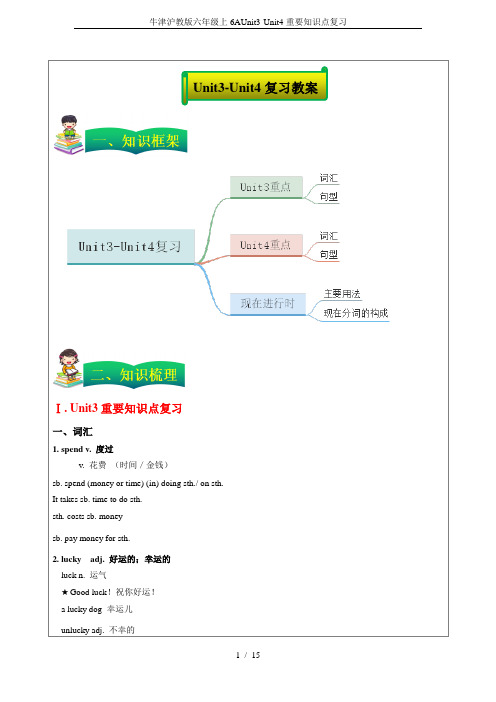
Unit3-Unit4复习教案Ⅰ. Unit3重要知识点复习一、词汇1. spend v. 度过v. 花费(时间/金钱)sb. spend (money or time) (in) doing sth./ on sth.It takes sb. time to do sth.sth. costs sb. moneysb. pay money for sth.2. lucky adj. 好运的;幸运的luck n. 运气★Good luck!祝你好运!a lucky dog 幸运儿unlucky adj. 不幸的4) 当动词为重读闭音节或以重读闭音节结尾时,要重复词尾的辅音字母,再加-ing,如:running, stopping, swimming, beginning 等.★现在进行时常用的时间状语有:now, nowadays, at the moment, these days等。
三、句型(1)肯定句:be + Ving I am listening to the music.(2)否定句:be + not +Ving I am not listening to the music.(3)一般疑问句:把Be动词提到句首Are you listening to the music?(4)特殊疑问句:疑问词+be+主语+Ving What are you doing?(当疑问词作主语时其结构为):疑问词+be+Ving Who is listening to the music?【课堂小练】I.练习一:现在分词的变形(错误率:掌握情况:)Model: do→ doing1. talk __________2. make __________3. study __________4. sing __________5. picnic __________6. run __________7. begin __________ 8. go __________ 9. write __________10. put __________ 11. lie __________ 12. die __________II.练习二:Fill in the blank in its proper tense.(错误率:掌握情况:)1. __________ your mother __________ rooms every day? (clean)2. A: Where __________ John? (be)B: He __________ a model ship in his room. (make)3. It’s already six o’clock in the afternoon. But those boys __________ (still play) computer games in thebet-bar.4. A: What __________ you __________? (do)B: I __________ (read) today’s newsp aper.5. When __________ your first class __________? (begin) -At 8:05.III.Choose the best answer (选择) (错误率:掌握情况:)( ) 1. _______________ c an fly a plane in the sky.A. A businessmanB. A firemanC. A cookD. A pilot ( )2. Mr Wang wants to make sick people feel ________________ .A. goodB. wellC. betterD. best ( )3. Samuel Han_______________ w ork at eight o'clock in the morning.A. startedB. startsC. finishedD. finish( )4. What ______________ your uncle do?A. doB. doesC. doingD. to do ( )5. I would like to be a teacher. That's ________________ I would like to be.A. howB. whatC. whenD. where ( )6. Mr Wang is a cook. He likes to cook delicious food _______________ people.A. withB. toC. forD. about ( )7. —How old are you?A. I am twenty-firstB. I am twenty-one year oldC. I am twenty-one years oldD. I am twenty-first years old( )8. —Why do you like this new book?—____________ it is very interesting and it is very useful.A. AndB. ButC. OrD. Because ( )9. Can you _______________ the person who stole(偷) the woman's bag?A. findB. lookC. look forD. find out ( ) 10. —Do you like your job now?A. Yes, I wouldB. No, I wouldn'tC. Yes, I doD. No, I doesn't ( ) 11. Would you like to be _____________ English teacher?A. anB. aC. theD./( )12. My uncle is a good worker. _______________ o ften works very quickly.A. SheB. HerC. HimD. He ( )13. ___________ you have time, please come to my birthday party.A. IfB. WhyC. Why notD. How ( ) 14. We usually begin our first class ________________ 8 o'clock ___________ the morning.A. at; onB. on; outC. in; atD. at; in ( )15. ___________ do you usually work from Monday to Friday?A. How longB. How oldC. How oftenD. How farYou found out that she was the biggest mouth ever and loved to j to conclusions without knowing much. She behaved like a 16-year-old kid when she was like 25. You didn't know why but every time you s her, you didn't want to move close to her.I personally don't like to have prejudice about people. However, I always take a disliking to really rude people. I must admit disliking a certain few after I've met a handful of people. Most of the time it's because they are too proud, stupid, rude, arrogant and annoying. I feel it is okay to dislike someone for whatever r .A bad first impression is really t . It's just human nature, sometimes you dislike them to begin with, but after you know them you like them.D. Answer the questions (回答问题)All students need to have good study habits. When you have good study habits, you learn things quickly. You also remember them easily.Do you like to study in the living room? This is not a good place, because it is usually too noisy. You need to study in a quiet place, like your bedroom. A quiet place will help you only to think about one thing.When you study, do not think about other things at the same time. Only think about your homework. If you do this, you will do your homework more quickly, and you will make fewer mistakes.Good study habits are very important. If you do not have them, try to learn them, if yours are already good,try to make them better.1.How do you learn things when you have good study habits?2.When do you remember things easily?3.What shouldn't you do at the same time when you study?4.What must you only think about when you study?5.If you do not have good study habits, what must you do?1.默写两个单元的单词和词组。
上海版牛津英语六年级(上下)全重点知识点复习整理

上海版牛津英语六年级(上下)全重点知识点复习整理上海版牛津英语六年级(上、下)全重点知识点复习整理上海牛津英语六年级上下册全知识点梳理频度副词always/sometimes/usually/never是频度副词,提问应该要用howoften??在句中的边线就是:放到犯罪行为动词的前面,放到be动词的后面。
也可以说道“行前系后”。
e.gsheisalwayskind.她总是很正直的。
shealwayshelpsotherpeople.她总是帮助其他人。
不能出现这样的句子:sheisalwayshelpsotherpeople.(×)一句话中无法同时发生两个动词。
并且必须特别注意主谓保持一致,尤其特别注意第三人称单数不可以忽略。
howoften与howmanytimeshowoften回答“频率次数+时间范围”howmanytimes回答“频率次数”e.g.―howoftendoyouexercise?―twiceaweek.―howmanytimeshaveyoubeenthere?―twice.副词则表示动作特征或性状特征。
通常用以形容或润色除了名词和代词以外的词,主要润色形容词、动词、其他副词和句子。
helooksveryhappy.(润色形容词)theoldladyiswalkingslowlynow.(修饰动词)luckily,hegotthefirstprize.(修饰句子)形容词后面+ly构成副词:slow―slowlyslight―slightlyquick―quicklycareful―carefullyfierce―fiercelyim mediate―immediatelygentle―gentlylucky―luckilyhappy―happily介词whatelsedoyoudowithyour??你和你的?还干什么?with就是个介词,后面直奔人称代词时,必须用宾格的形式。
沪版牛津英语六年级(上)知识点提要

知识点提要:一、语音容易读错的生词音标(想不起来的话,课后音标一一对照)granddaughter almost friendly naughty promise reuse discuss island dragon market museum activity secretary bank clerk choir * parent project invitation club___________________________________________________________housing estate exitprawn * wingsour * enough pyramid yogurt exercise than suggestion porridge *二、词汇与词组1.容易错的单词拼写➢an aunt / an uncle 首字母发音都是元音,所以前面跟的不定冠词用“an”,同理,an hour ago (h不发音,所以用an).➢注意比较:an umbrella vs. a useful book 虽然都是字母U开头,但是因为u的发音不同,所以前面跟的冠词就不一样。
另外,需要特别注意interesting / exciting 这样的元音开头的形容词,它们放在某个单数名词前面做修饰,这时也要用冠词an;但如果在它们前面又加了程度副词v ery / more…则冠词又必须变回a。
比如:a book vs. an interesting book vs. a very interesting book➢the Earth (大写E,且前面必须使用定冠词the, 表示独一无二的事物) ➢Friends of the Earth 表示一个环保组织(属于专有名词),F / E大写。
牛津课本上是把他们看成该组织的所有成员(相当于people),动词用复数;不过,某些习题书上也会把它看成一个组织,动词用单数。
上海牛津版英语六年级第一学期6A期末复习知识点总结1

must not
必须、很重要或必要不准,不允许或禁止
Wemust study hard.
You mustn’t leave school alone.
提问
把情态动词单独提前
Must we wait foryou?Yes,youmust ; No,youneedn’t.(非mustn’t)
花钱花时间
.spen.tw.yua.o.thi.pen...spen.tw.yua.i.buyin.thi.pen.
I spend two yuan on this pen.=I spend two yuan in buying this pen.
表示提议的句型
Shall we
Shall是情态动词+接动词原形
a little
只能修饰不可数名词,a little milk.
some
a lot of plenty of
既可修饰可数名词又可修饰不可数名词。当及可数名词连用时,只能及可数名词的复数形式连用
k. Plent.o.eggs.
someeggs. a lot of milk. Plenty of eggs.
the one on the left/right , the one in the middle =the left/right/middle one.
地点、方位表述
near离**近
far(away)from离**(很)远
直接接地点
.liv.nea.school. H.live.fa.awa.fro.school.
六年级英语(上)知识点
频度副词
频度副词
always、sometimes、usually、never
小学英语六年级上册(牛津上海版) Unit6 going to school 知识点总结
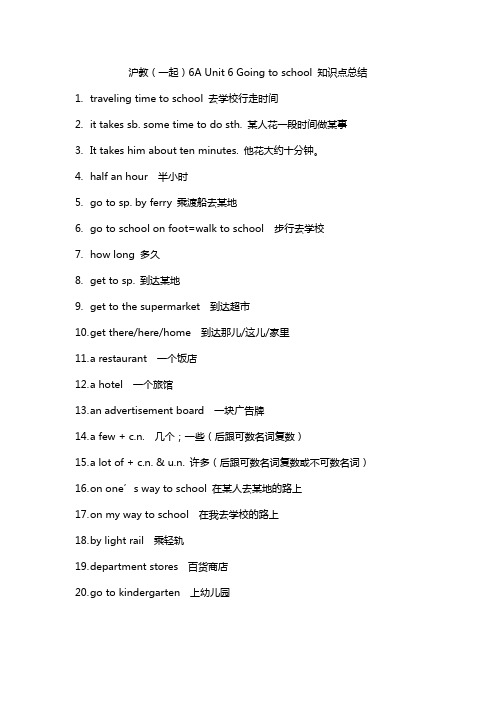
沪教(一起)6A Unit 6 Going to school 知识点总结1.traveling time to school 去学校行走时间2.it takes sb. some time to do sth. 某人花一段时间做某事3.It takes him about ten minutes. 他花大约十分钟。
4.half an hour 半小时5.go to sp. by ferry 乘渡船去某地6.go to school on foot=walk to school 步行去学校7.how long 多久8.get to sp. 到达某地9.get to the supermarket 到达超市10.g et there/here/home 到达那儿/这儿/家里11.a restaurant 一个饭店12.a hotel 一个旅馆13.a n advertisement board 一块广告牌14.a few + c.n. 几个;一些(后跟可数名词复数)15.a lot of + c.n. & u.n. 许多(后跟可数名词复数或不可数名词)16.o n one’s way to school 在某人去某地的路上17.o n my way to school 在我去学校的路上18.b y light rail 乘轻轨19.d epartment stores 百货商店20.g o to kindergarten 上幼儿园语言点1. near 离…很近后面直接接地点I live near school.=My home is near school.我家离学校很近。
2. far away from=far from离…很远He lives far away from school.=His home is far from school.他家离学校很远3.by bus/bike/car/underground/train/ferry动词短语:take a bus/bike/car/underground/train/ferry ride a bikeHe goes to school by bus.=He takes a bus to school.4. on foot 动词:walkShe goes to work on foot every day.=She walks to work every day.5. It takes sb. some time to do sth. 花费某人多少时间做某事。
小学英语六年级上册(牛津上海版) Unit6 going to school 知识点总结

沪教(一起)6A Unit 6 Going to school 知识点总结1.traveling time to school 去学校行走时间2.it takes sb. some time to do sth. 某人花一段时间做某事3.It takes him about ten minutes. 他花大约十分钟。
4.half an hour 半小时5.go to sp. by ferry 乘渡船去某地6.go to school on foot=walk to school 步行去学校7.how long 多久8.get to sp. 到达某地9.get to the supermarket 到达超市10.g et there/here/home 到达那儿/这儿/家里11.a restaurant 一个饭店12.a hotel 一个旅馆13.a n advertisement board 一块广告牌14.a few + c.n. 几个;一些(后跟可数名词复数)15.a lot of + c.n. & u.n. 许多(后跟可数名词复数或不可数名词)16.o n one’s way to school 在某人去某地的路上17.o n my way to school 在我去学校的路上18.b y light rail 乘轻轨19.d epartment stores 百货商店20.g o to kindergarten 上幼儿园语言点1. near 离…很近后面直接接地点I live near school.=My home is near school.我家离学校很近。
2. far away from=far from离…很远He lives far away from school.=His home is far from school.他家离学校很远3.by bus/bike/car/underground/train/ferry动词短语:take a bus/bike/car/underground/train/ferry ride a bikeHe goes to school by bus.=He takes a bus to school.4. on foot 动词:walkShe goes to work on foot every day.=She walks to work every day.5. It takes sb. some time to do sth. 花费某人多少时间做某事。
牛津上海版 六年级第一学期英语考点汇总
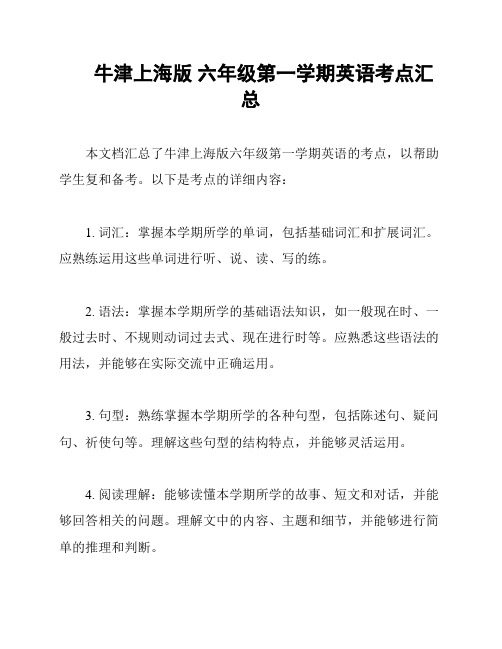
牛津上海版六年级第一学期英语考点汇
总
本文档汇总了牛津上海版六年级第一学期英语的考点,以帮助学生复和备考。
以下是考点的详细内容:
1. 词汇:掌握本学期所学的单词,包括基础词汇和扩展词汇。
应熟练运用这些单词进行听、说、读、写的练。
2. 语法:掌握本学期所学的基础语法知识,如一般现在时、一般过去时、不规则动词过去式、现在进行时等。
应熟悉这些语法的用法,并能够在实际交流中正确运用。
3. 句型:熟练掌握本学期所学的各种句型,包括陈述句、疑问句、祈使句等。
理解这些句型的结构特点,并能够灵活运用。
4. 阅读理解:能够读懂本学期所学的故事、短文和对话,并能够回答相关的问题。
理解文中的内容、主题和细节,并能够进行简单的推理和判断。
5. 听力理解:能够听懂本学期所学的对话、问答和短文,并能
够回答相关的问题。
理解听力材料中的信息、关键词和上下文,并
能够从中获取必要的信息。
6. 书写能力:书写要规范、清晰、工整。
应注意字母的大小写、大小比例和书写流畅度。
能够正确书写所学的单词、短语和句子。
7. 口语表达:能够运用所学的句型和词汇进行口语交流。
应注
意语音语调的准确性和自然流利度。
能够表达自己的观点、描述事
物和表达意愿。
希望通过对以上考点的复和总结,学生们能够在英语考试中取
得好成绩。
祝大家好运!
(Word count: 195)。
- 1、下载文档前请自行甄别文档内容的完整性,平台不提供额外的编辑、内容补充、找答案等附加服务。
- 2、"仅部分预览"的文档,不可在线预览部分如存在完整性等问题,可反馈申请退款(可完整预览的文档不适用该条件!)。
- 3、如文档侵犯您的权益,请联系客服反馈,我们会尽快为您处理(人工客服工作时间:9:00-18:30)。
Module 1 Family and friendsUnit 1 Family and relatives1.family and relatives 家庭和亲戚2. a family tree 一个家谱3.grandsons and granddaughters 孙子和孙女们/外孙和外孙女们4.get a lot of presents 得到许多礼物5.Happy Birthday (to sb.) ! 生日快乐!6.get a birthday card from sb. 从某人那儿得到一张生日卡7.one of my family members 我的家庭成员之一8.only have one aunt 仅仅有一个阿姨9.my classmates 我的同班同学10.go shopping 去购物11.what else 其他什么12.play badminton 打羽毛球13.go cycling 去骑自行车14.go swimming 去游泳15.two cousins 两个堂/表兄弟/妹16.how many + 名词复数多少……语言点1. This is my grandfather.这是我的(外)祖父。
These are my family and relatives.这些是我的家人和亲戚。
注意句中各成分保持单复数同形。
2. I?m their son.. 我是他们的儿子。
We?re their sons.我们是他们的儿子。
3. How many uncles do you have?你有多少个叔叔?How many后面接可数名词的复数形式。
你和你的…干什么?4. What do you do with your…?你和你的…还干什么?5. What else do you do with your…?你和你的…还干什么?With是个介词,后面接人称代词6. What else do you do with your…?时,要用宾格的形式。
With me/him/her/it/us /them7. always/sometimes/usually是频度副词,提问应该要用How often…?Unit 2 I have a good friend1.help each other 互相帮助2.help other people = help others 帮助别人3.not…at all 根本不4.go out at night 在晚上出去5.like to be together 喜欢在一起6.walk to school together 一起走去学校7.be friendly 友好的8.be helpful 有帮助的9.work hard = study hard 努力学习10.be late for school 上学迟到11.get angry 变得生气12.be kind to others 对别人友善的13.share sth. with sb. 和某人分享某物14.be never naughty 从不淘气15.never tell a lie/lies 从不说谎16.a visit to sp. 一次去某地的参观17.live in the USA = live in America 居住在美国18.visit sp. for the first time 第一次参观某地19.ask sb. about sth. 询问某人关于某事20.have/has been to sp. 曾去过某地21.Ocean Park 海洋公园22.Garden City Zoo 花园城市公园23.Water World 水上世界24.Friends of the Earth 地球的朋友25.look after = take care of 照顾,照看26.look after the environment 照顾环境27.all the things round us 我们周围所有的东西28.pollute the air 污染空气29.air pollution 空气污染30.water pollution 水污染nd pollution 陆地污染32.keep sth. clean 保持某物干净33.pick up 捡起,拾起34.put rubbish into rubbish bins 把垃圾放入垃圾箱35.tell sb. to do sth. 告诉某人做某事36.tell sb. not to do sth. 告诉某人不要做某事37.leave rubbish 留下垃圾38.want to be/become 想要成为39.want to do sth. 想要做某事40.promise to do sth. 承诺做某事41.promise not to do sth. 承诺不要做某事42.our promises 我们的承诺43.discuss sth. with sb. 和某人讨论某事44.reuse shopping bags 再使用购物袋45.What about/How about sth./doing…? ……怎么样?语言点:1.always/sometimes/usually/never 是频度副词.在句中的位置是:放在行为动词的前面,放在be动词的后面。
也可以说“行前系后”。
She is always kind.她总是很善良的。
She always helps other people.她总是帮助其他人。
不能出现这样的句子:She is always helps other people.(×)一句话中不能同时出现两个动词。
并且要注意主谓保持一致,尤其注意第三人称单数不可以忽略。
2.They like to be together.他们喜欢在一起。
like to do sth.=like doing sth.喜欢做某事He likes to play football.=He likes playing football.他喜欢踢足球。
3.She can?t read or write.她既不会读也不会写。
or用在否定句中表平列关系。
and用在肯定句中表平列关系。
She can read and write.她既会读又会写。
4. help each other互相帮助5. other people=others其他人6. be kind to sb.对某人很友好7. tell a lie = tell lies说谎8. share sth. with sb.和某人分享某物She shares her bread with me .她把她的面包分给了我。
9. in the USA在美国USA要大写。
10. for the first time第一次11. on Saturday具体的某一天介词用on你去过…..吗?12. Have you been to …..yet?Yes, I have already/just been to…./been there.是的,我已经去过了。
不,还没有去过。
No, I haven?t been to …/been there yet.already/just用于肯定句中。
yet用于否定和疑问句中。
Unit 3 Spending a day out together1.spend a day out together 一起在外度过一天2.on Green Island 在绿岛上3.in Happy Town 在快乐城4.in Dragon Bay 在龙湾5.on Lucky Island 在幸运岛上6.at weekends = at the weekend 在周末7.be near sp. 离开某地近的8.be far (away) from sp 离开某地远的9.Seaside Town 海边镇10.a photo of my family and me 一张我家人和我的照片11.have lunch together 一起吃午饭12.Green Market 格林市场13.In Sunny Town 在太阳城14.Space Museum 太空博物馆15.In Moon Town 在月亮城16.an activity 一项活动17.have a barbecue 进行一次烧烤18.fly kites 放风筝19.ride bicycles 骑自行车20.make sandcastles 筑沙堡21.collect shells 收集贝壳22.make an album 制作一本照片簿23.plan to do sth. 计划做某事24.a good idea 一个好主意25.which place 哪一个地方26.plan a trip 计划一次旅行27.How about… ……怎么样?(常用于表示建议或提议)28.be going to + v. 打算做…语言点:1. at weekends= at the weekend在周末2. near/ far away from离….近/远near后直接接地点名词?你去了….哪个地方?3. Where have you been in….我去了….I have been to….in /on… Where have you been in Shanghai?你到过上海哪里?I have been to Century Park in Shanghai.我到过上海的世纪公园。
6.a photo of my brother and me 一张我哥和我的照片。
a photo of后接人称代词时,应该用宾格形式 a photo of me/him/her/it/us /them7. be +V-ing 表现在进行时8. cost以物作主语,通常是问价钱Take以it作主语。
通常是花费时间It takes me 15 minutes to go to school.Spend 以人作主语,既可以是花费金钱,也可以是花费时间。
Spend time/money on sth. spend time/money in doing sth. I spend two yuan on this pen.=I spend two yuan in buying this pen.9.Which place shall we visit?我们将参加哪个地方?10.When are we going to come back?我们将什么时候回来?Come back回来Be going to 表将来begoing to=will 11. How are we going to get there?我们将怎样到达哪里?How对交通工具进行提问。
